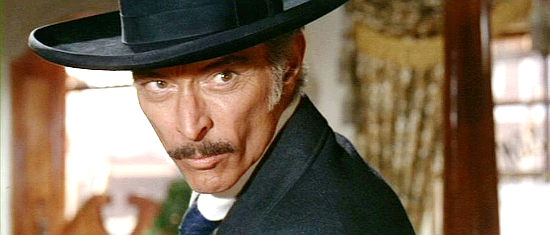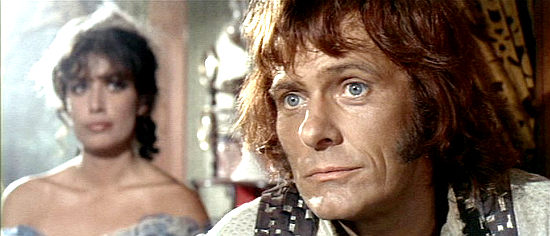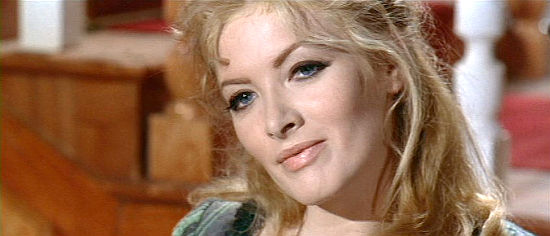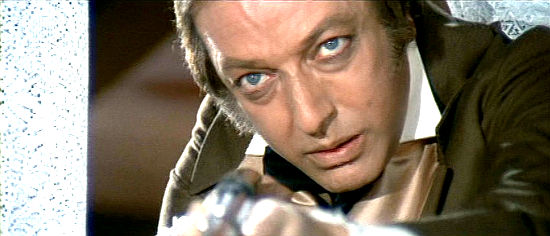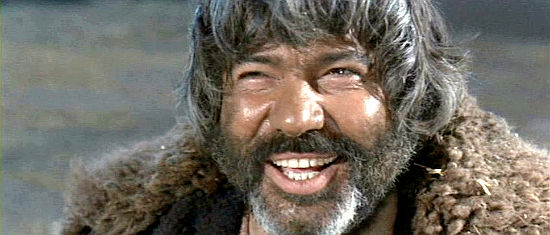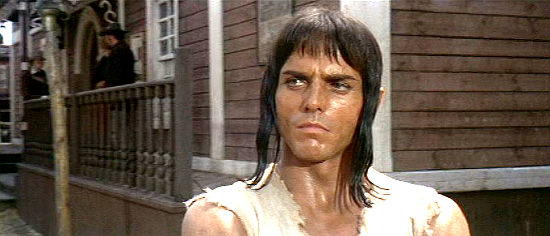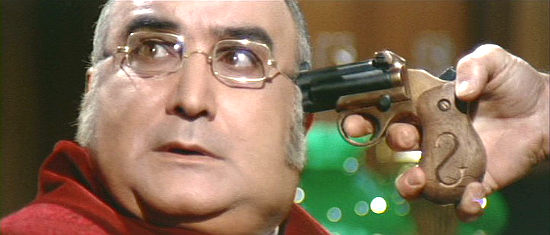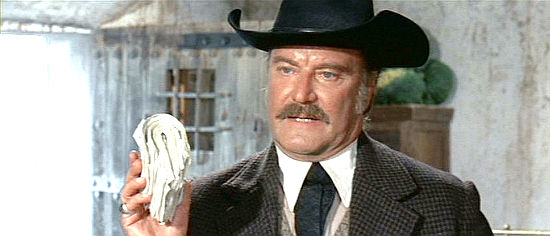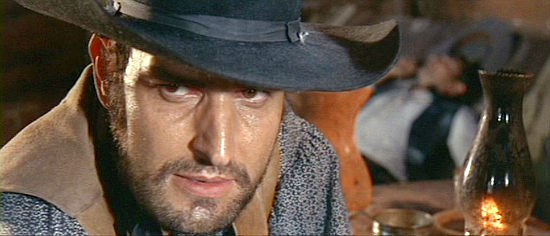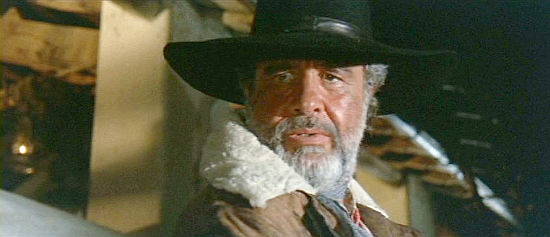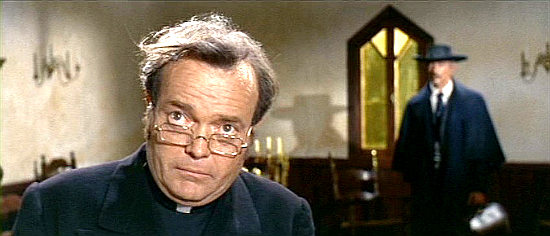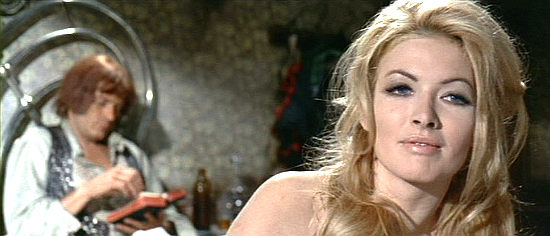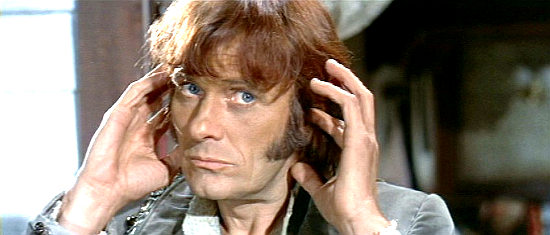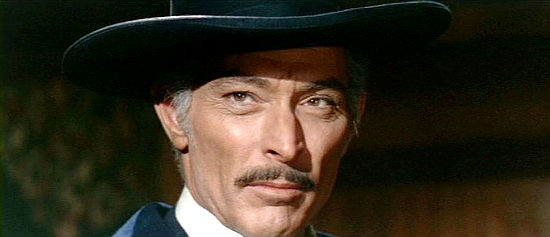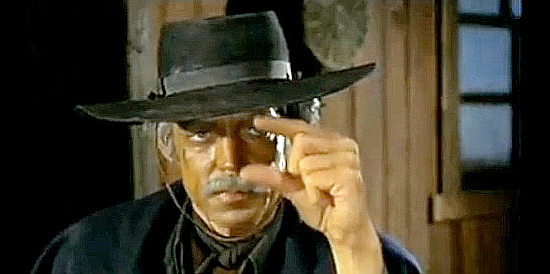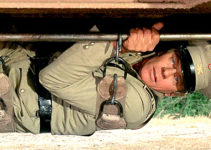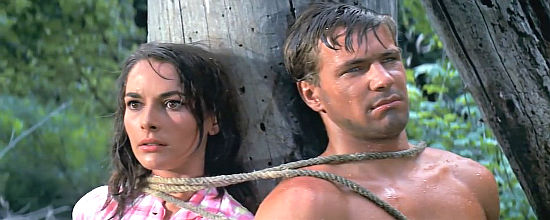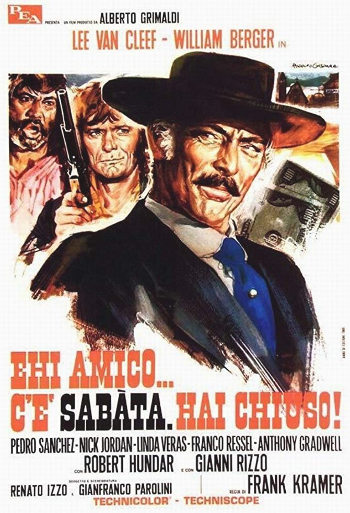 Lee Van Cleef plays the title role. He arrives in the town of Daugherty and promptly recovers $100,000 in stolen loot.
Lee Van Cleef plays the title role. He arrives in the town of Daugherty and promptly recovers $100,000 in stolen loot.
Rather than keeping it for himself, he returns it to the authorities for a $5,000 reward.
“You bargain like a woman,” scoffs his newfound friend Carrincha.
Ah, but Sabata has stumbled upon a potentially profitable truth. Three town fathers — Stengel, Ferguson and O’Hara — helped planned the robbery and are now ripe for blackmail.
Sabata spends the rest of the film trying to collect, and raising the price of blackmail ever higher as attempt after attempt to eliminate him fails.
Of course, he has help. In addition to Carrincha, he gets an assist from an acrobat named Alley Cat and a strumming former friend named Banjo (William Berger).
Hold it: Banjo is on Sabata’s side, isn’t he?
One of Spaghetti’s best non-Sergio films, filled with gimmicks, plot twists and featuring a great score by Marcello Giombini.
Franco Ressel as Stengel makes for a suitably evil and egotistical villain, equipped with his own lethal gadgets, including a pair of human shaped cutouts to stage gunfights behind.
Linda Veras adds a touch of beauty to the film as a saloon girl/hotel clerk named Jane, who has hooked up with Banjo, hoping he’ll help her escape the drudgery of the West.
Directed by:
Gianfraco Parolini
(Frank Kramer)
Cast:
Lee Van Cleef … Sabata
William Berger … Banjo
Ignazio Spalla … Carincha
as Pedro Sanchez
Aldo Canti … Alley Cat
as Nick Jordan
Linda Veras … Jane
Franco Ressel … Stengel
Gianni Rizzo … Judge O’Hara
Antonio Gradoli … Ferguson
Claudio Udari … Oswald
as Robert Hundar
Maro Zuanelli … Sharky
Lucian Pigozzi … Father Brown
as Alan Collins
Also with: Spartaco Conversi as Spanny Convery, Carlo Tamberlani as Charles Tamblyn, Franco Marletta, Andrea Aureli as Andrew Ray, John Bartha as Janos Bartha, Giuseppe Mattei as Joseph Mathews, Romano Puppo, Clemente Ukmar, Franco Ukmar, Bruno Arie, Fortunato Arena
aka:
Ehi amico … c’e Sabata, hai chiuso
Score: Marcello Giombini
Runtime: 106 min.
Memorable lines:
Carincha: “What are they good for? Medals? In war, they’re all companeros. Then, when they get home, they aren’t worth a damn.”
Sabata, having just driven a wagon loaded with a safe and seven dead men into Dougherty: “Gentlemen, anyone around here lose a safe?”
Jane: “A new man who blows into town and already has picked up $5,000 is interesting.” She has Sabata sign the hotel register. “(Room) number seven. It’s the best in the house. Next to mine. You staying on long?”
Sabata: “Just passing through.”
Jane: “You never know.”
Stengel, reading to one of his henchmen: “All men gifted with superior talents, and thus with superior powers, must command and use inferior men.”
Jane to Banjo: “Dreams, dreams. We’re a great pair, you and me. At least I’ve always got something I can make money on (as she dresses). You, strumming away on that stupid banjo …”
Carincha to Sabata: “Mister, I must tell you, until you got here, Dougherty was nice and quiet. The devil rides with you.”
Banjo: “We’re just alike.”
Sartana: “I’m on the right side.”
Banjo: “Which side is that?”
Sartana: “Not the side against the law.”
Stengel to Sartana: “Before you die, you should know that those men with superior talents, and consequently with superior powers, always have one last card to play.”
Sartana: “You know Stengel, I wouldn’t bet a dollar on that last card.”
Trivia:
The first of three Sabata films, followed by “Adios, Sabata” (1970), starring Yul Brynner and “Return of Sabata” (1971) with Lee Van Cleef back in the title role. The second film was suppose to introduce Brynner as a new character named Indio Black — but was changed to capitalize on the international success of this film.
Gianfranco Parolini — aka Frank Kramer — was also the director responsible for introducing us to the Sartana character in “If You Meet Sartana, Pray for Your Death” (1968). Suddenly Sartanas and Sabatas were popping up all over the Spaghetti West.
Advertising for this film billed Lee Van Cleef as “The Man with the Gunsight Eyes.”
